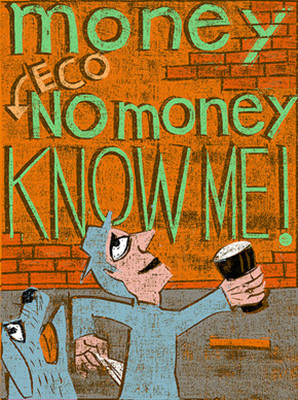錢是如何運作的
Gold rush
淘金熱
A good guide to the stuff in our pockets
一本關于我們囊中物的優秀指南
Money: The Unauthorised Biography. By Felix Martin.
《金錢:非授權自傳》。作者:Felix Martin。
ONE story in this surprisingly entertaining book on the nature of money is about the Irish banking crisis. The country's bank system ground to a complete stop, with branches closed, the clearing system suspended and customers unable to withdraw or deposit money. As cash ran out, people had to find a way of paying their regular bills, or even just stumping up for a pint of stout in a pub. What actually happened was that businesses started accepting IOUs or cheques for everything, even though there was no telling when the cash would be forthcoming. It helped that a lot of Irish life is lived locally: builders, greengrocers, mechanics and barmen all turned out to be dab hands at personal credit profiling.
這本關于金錢性質的書出乎意料地有趣,其中一個故事與愛爾蘭銀行危機有關。愛爾蘭的銀行系統完全癱瘓,各分行全部關閉,清算系統被暫停,顧客無法存取款。在現金用完后,人們不得不想辦法支付日常賬單,就連在酒吧為一品脫烈性黑啤埋單也是如此。結果商家開始接受欠條或支票,雖然沒人知道現金何時會來。還好愛爾蘭人的生活起居很大程度上都可以在當地解決:建筑工、零售店主、機械師和酒保搖身變成了個人信用建檔的行家 。

In short, Ireland developed a new class of money. Its currency was not backed by any central bank, but based solely on informal if surprisingly accurate credit scoring. And the currency was transferable: if certain people said the bond was good, then the bond was good.
總之,愛爾蘭發展出一種新的錢種類。其貨幣不被任何央行支持,僅僅基于非正式卻出奇準確的信用記錄。并且這種貨幣是可流通的,如果某些人說債券有效,那么債券就有效。
This particular Irish banking crisis might seem vaguely familiar, but only vaguely. It took place more than 40 years ago, when the Irish financial sector came to a seven-month halt as a result of a national labour dispute. The point of the story is that it supports two of the author's main contentions—first that money is not currency and that sovereign support for currency is not particularly important, and second that financial crises are endemic. No sooner has the last one been put to bed than the next is waking up.
這個奇特的愛爾蘭銀行危機聽起來可能隱約有些熟悉,但也只是隱約而已。那次危機發生在40多年前,當時愛爾蘭金融業因全國勞動爭議癱瘓了七個月。講這個故事是因為它支持了作者的兩點主張——第一,錢不是貨幣,并且主權對貨幣的支持并非特別重要;第二,金融危機是普遍的,剛剛解決一個危機,另一個危機又出現了。
For some people, money is merely something underwritten by the state and designed to enhance a basic barter economy. Felix Martin, an economist and fund manager, goes further. Early societies, such as the Babylonians and the ancient Egyptians, were static, with a fixed hierarchy of social obligations. They had no need of money or currency. Money was the instrument through which later societies unshackled themselves from preordained social orders and became individualistic.
對于一些人來說,金錢僅僅是國家擔保的東西,用于增強基本的物物交換。經濟學家、基金經理Felix Martin對金錢的理解更進了一步。早期社會,例如巴比倫和古埃及,是靜止的,每個階層承擔的社會責任固定不變。這些社會不需要金錢或貨幣。金錢將之后的社會從上天安排的社會制度中解放出來,變為個人主義。
With money came speculation, bringing in turn those endemic financial crises. To ensure greater stability, Mr Martin would like to see the introduction of an ultra-simple version of “limited-purpose banking”. Money must be “shorn of its specious promise” he says; let the state underwrite a tiny core of deposit-taking banks. Everything else—from interest-rate derivatives to collateralised debt obligations should carry on unregulated and uninsured. If you lose your dough, tough. You knew the risks. It is a solution that will attract anyone seeking a clean, clear, fair way of managing financial markets. Until they lose their money, of course.
有金錢就有投機,有投機就有普遍的金融危機。為確保穩定性,Martin希望引入超簡版的“限制用途銀行”。他說,必須“去除”金錢“似是而非的承諾”;讓國家為儲蓄銀行極少的核心業務擔保。其他業務—從利率衍生工具到債務抵押債券—應繼續不受監管,不受保護。如果你輸了錢,糟糕。不過你本來就知道風險的。這個解決方法會吸引尋求以干凈、清楚、公正的方式管理金融市場的人。當然在他們自己輸錢以前。












